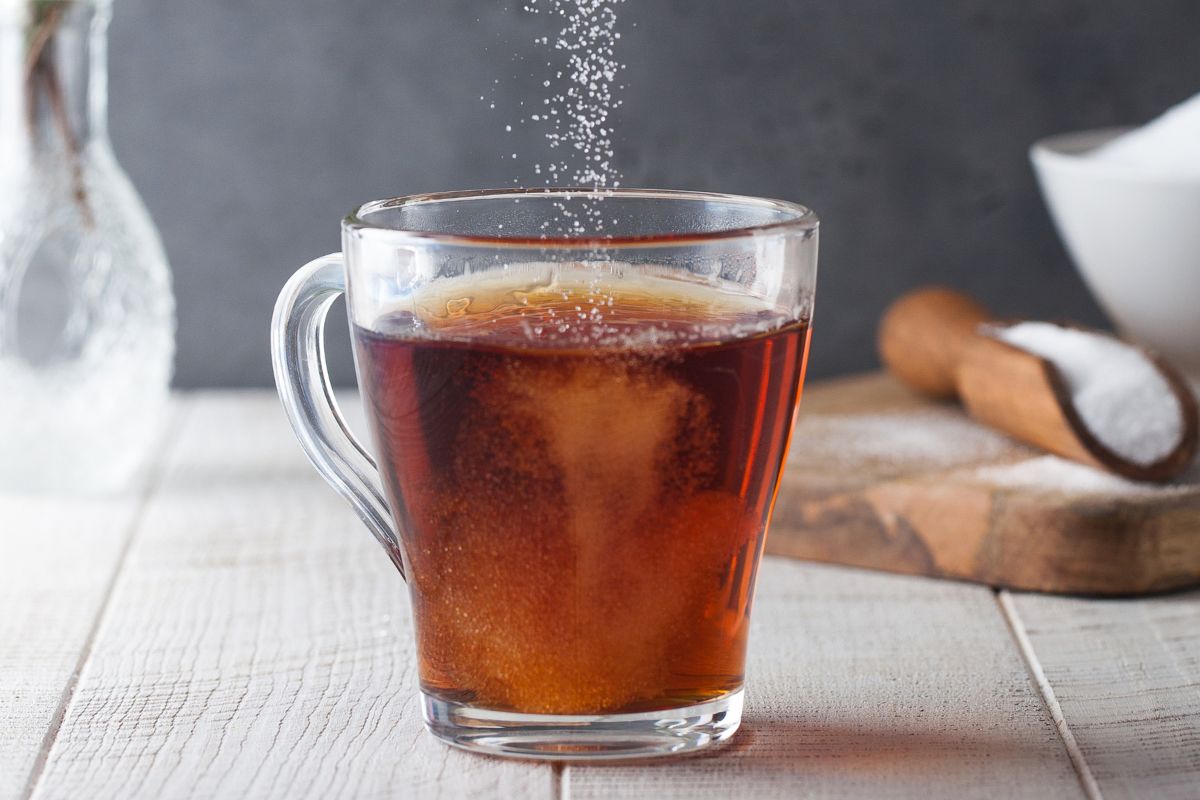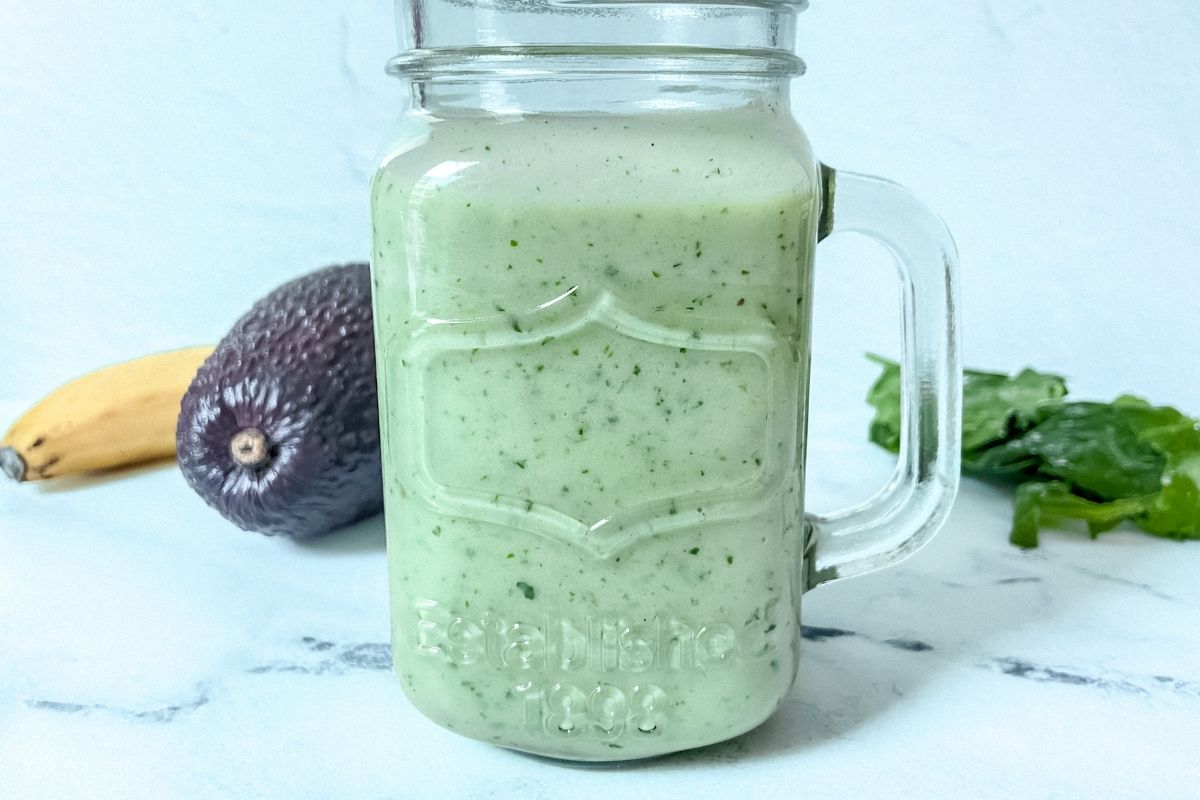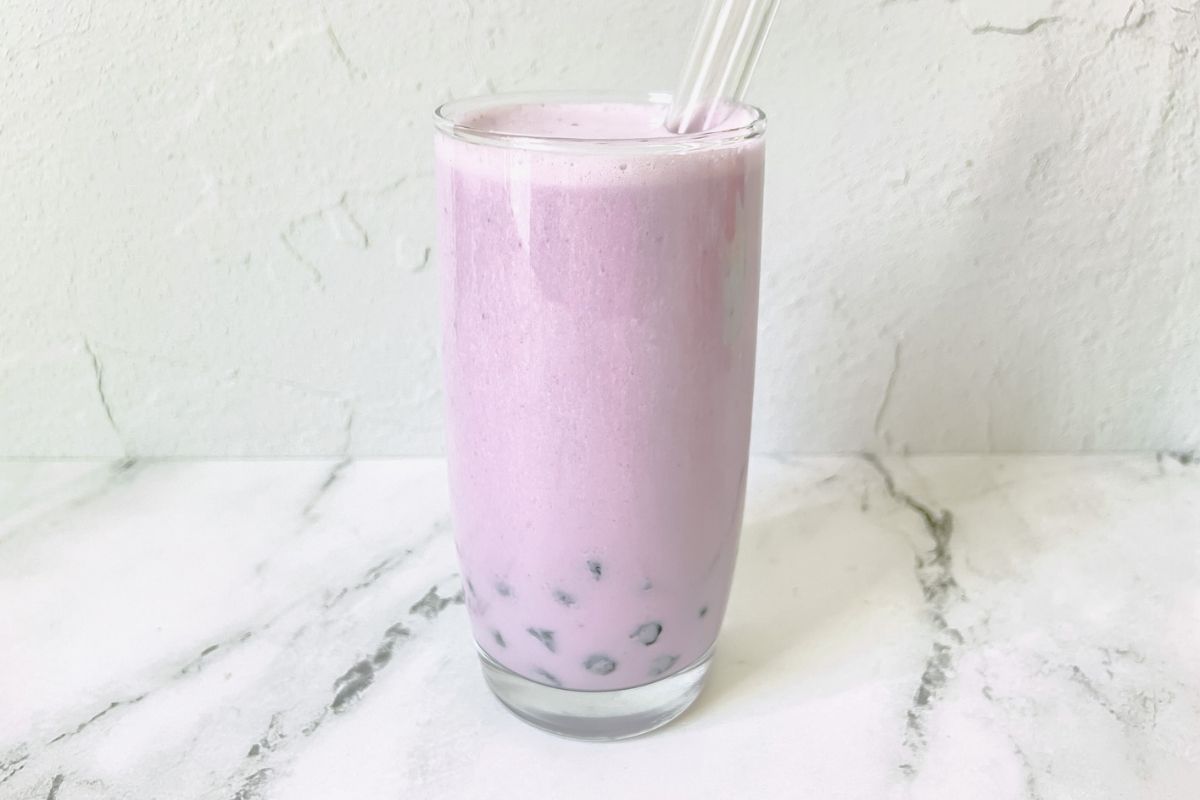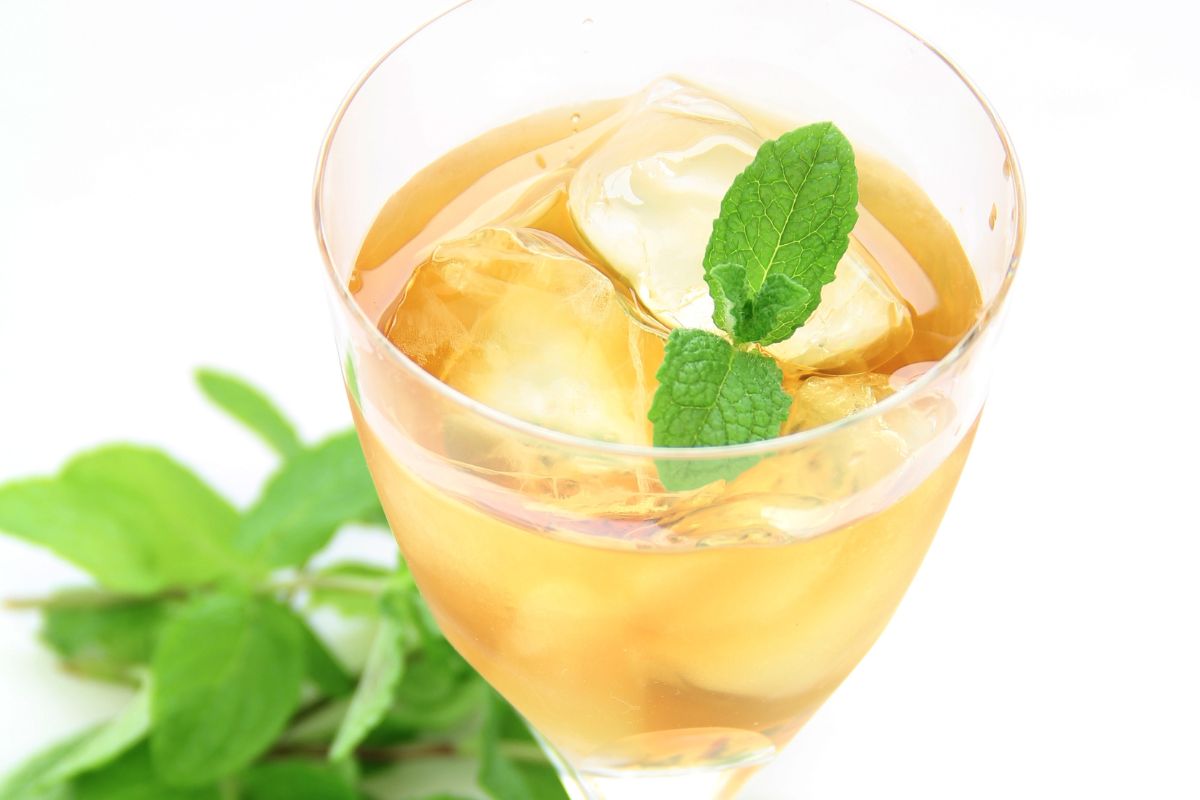How to sweeten tea without sugar
Do you enjoy your tea sweet, but you are trying to cut back on refined sugar? I’ve got you covered!
In this post I’m sharing my favorite ideas for how to sweeten your tea without sugar, wether you like your tea hot or cold.

Let me begin by telling that while I do happen to be quite passionate about nutrition, I won’t try to convince you on what sweetener is best for you.
White sugar isn’t enjoying the best reputation lately and I personally avoid it as much as I can.
But you’ve probably already heard about the issues associated with its overconsumption, so I’ll leave that discussion for health specialist and just focus on what goes well to sweeten your tea from a taste standpoint instead.
(That said, I’ve only put in this list options I would use for myself and my family)
So without further ado, let’s get to the options you have to sweeten your tea without sugar!
While I’ve written this list with tea in mind, you can use most of these as substitutes for sugar in coffee and any other kind of beverages as well.
Feel free to look for what interests you most in the table of contents bellow (my personal favorites are btw. 1.1. and the hidden gem 2.6.!)
This post may contain affiliate links. This means, if you make a purchase through one of these links, I may earn an affiliate commission at no extra cost to you. Here you can read my affiliate disclosure.
How to sweeten tea without real sugar
The reason we avoid refined sugar in our family is because the negative effects sugar may have for the health of teeth.
The good news is, if this is also your concern, there is more than one great sugar substitute to sweeten tea.
Not only the are considered teeth friendly, but they also have a low glycemic index, which means they won’t make your blood sugar spike.
They are lower in calories than refined sugar as well and most of them (unless specified) taste very neutral. So, one could say that, in general, they are all a very good option:
Xylitol
Xylitol or birch sugar is naturally present in some fruits and vegetables.
It looks and tastes like sugar, but it doesn’t have the same effect on teeth because oral bacteria don’t feed on them.
Nowadays you can easily find xylitol in granulated form at food stores.
Pros
- It may reduce the risk of cavities by remineralizing teeth.
- It doesn’t affect the flavor of the tea – it just give a neutral, sweet taste
Cons
- It may cause bloating
- It isn’t safe for dogs
How to use xylitol to sweeten tea
- Xylitol compares about 1:1 to sugar.
- Since it’s in powder form, xylitol dissolves better in hot tea or any other kind of warm drink. But you may also make a simple syrup with it.
Erythritol
Erythritol, like xylitol, belongs to the group of sugar alcohols, but despite the name, they don’t actually have any alcohol.
Erythriol has 6% the calories of sugar, zero glycemic index and it doesn’t cause tooth decay.
Since erythritol is naturally present in some plants, the powdered form sweetener is usually made from corn, apple or pears.
Pros
- It’s teeth friendly, it doesn’t have calories and it has zero glycemic index.
- It tastes like regular sugar.
Cons
- Some people may experience cramps, gas or even diarrhea.
- It may have a slightly cool aftertaste (whereas most people don’t notice it, and even when, it doesn’t usually bother).
How to use erythritol to sweeten tea
- This sweetener sweetener in powder form technically compares about 70% to sugar, but many people use it 1:1 to sugar.
- It dissolves in water just as sugar does.
Stevia

Stevia is a plant with extremely sweet leaves.
This popular sweetener is calorie free and it has no negative effects on blood sugar. Also, it doesn’t harm the health of teeth or gums.
Pros
- It’s calorie-free, has no effects on blood sugar levels nor negative effects on teeth or gums.
- You can easily find it not only in powder (granulated) form, but also in liquid form (stevia drops), which comes very handy for cold drinks.
Cons
- The taste may be a bit off for some, as it is quite different from refined sugar. It takes some time to get used to it.
How to use stevia to sweeten tea
- As stevia has such a strong sweet flavor, you only need to use a tiny amount. So, most brands need some bulk ingredients to make a powder or liquid that can be measured. This is why the amount you need vary depending on the brand you use.
- You may also steep stevia leaves directly: some sweet tea blends already contain a little amount of stevia leaves.
Monk fruit

Monk fruit comes, like stevia, from a plant (Luo Han Guo) that has extremely sweet leaves.
Also like stevia, this natural sweetener doesn’t have any calories and it doesn’t feed the harmful mouth bacteria.
Pros
- It has zero calories, it doesn’t impact blood sugar and doesn’t harm oral health.
- It doesn’t have the strong aftertaste of stevia. Some people find, it taste similar to cane sugar instead.
- It’s available both as powder and in liquid form. Liquid sweeteners like these may be one of the easiest way to sweeten cold drinks.
Cons
- Although it’s considered safe, it isn’t approved as a sweetener in the EU yet (at least to date), so it’s difficult to find if you live in Europe.
How to use monk fruit to sweeten tea
Just as stevia, it is so much sweeter than sugar, so it’s often mixed with other sweeteners (as in Lakanto, which is a blend of monkfruit and erythritol) and you’ll have to follow the recommendations in the package.
Tagatose
Tagatose is a prebiotic monosaccharide that can be naturally found at low levels in dairy products.
Pros
- It’s low in calories (less than 1.5 – 2.4 kcal/g) and tooth-friendly.
Cons
- Because it’s quite new, there aren’t many long-term studies about it.
- It may cause bloating.
How to use tagatose to sweeten tea
Tagalose has 90% of the sweetness level of sugar, so you may substitute the sugar almost 1:1.
Allulose
Allulose looks like table sugar and tastes like it, but with about one-tenth its calories. And it doesn’t cause dental decay.
Pros
- Some studies suggest that it may help with weight loss. Source
Cons
- Just as tagalose, its effects aren’t so researched yet.
How to use allulose to sweeten tea
Allulose is 70% as sweet as sugar, however you may use it in a conversion 1 to 1.
Other substitutes for sugar in tea

If you are just trying to substitute white sugar for other less refined alternatives, bellow are some natural ways to sweeten your tea.
While these sugar alternatives usually enjoy a better name than table sugar, some argue that they aren’t nutritionally much better.
But as we discussed before, I’ll just focus on the taste they add to tea and leave the decision of which one may be the best and healthiest sweetener to you.
Coconut sugar

The taste of coconut sugar vary depending on type you use, but it usually has a taste and color similar to brown sugar, with a flavor that remembers of caramel.
So, you may use this powderer sweetener for any beverage you would like with brown sugar.
Dates syrup

Dates syrup is a thick syrup that looks like something between chocolate sauce and molasses.
It has a rich taste that remembers of caramel and it goes very well with black tea, hojicha latte and any type of beverage with milk.
Molasses
Molasses is a dark syrup with a robust, bittersweet taste that some people may enjoy with stronger teas, like black tea.
Maple syrup
Depending on the type of maple syrup, it can just add some sweetness to your tea or it can leave a pleasant caramel aftertaste.
Honey
A small amount of honey adds a warm and cozy feeling to any type of tea, from black tea to herbal tea. It also goes well for matcha latte.
Infused honey (like this vanilla infused honey) can spice up your teas and beverages.
Yacon syrup

Yacon syrup is made similar to maple syrup, but it just comes from another plant.
It also tastes and look similar to maple syrup, just slightly more intense, tasting somewhere between maple syrup and molasses.
Yacon syrup is low carb, but it’s less sweet that maple syrup or honey.
Yacon syrup may have a yacon aftertaste that some people like less than that of maple syrup.
That said, I personally use yacon syrup very often to sweeten my drinks because it reduces constipation and it may help lose weight.
I recommend using it for tea (or other drinks) with rather intense taste (for example, for black tea or chocolate milk).
In my opinion, it also goes great golden milk and to sweeten kefir.
Yacon syrup is also my go-to option when I want to sweeten homemade vegan milk.
Ideas to make your tea sweeter without using sugar
Up until now we’ve seen some substitutes for sugar in tea, wether sweeteners that are considered healthier (teeth friendly and safe for diabetics) or less refined alternatives that make for a pleasant taste addition.
However, if you want to make your tea taste somehow sweeter without the need of any kind of sweeteners, here are other ideas that may give your beverage a tasty twist:
Infuse some fruit in your tea

Put some ripe, fresh fruit in your tea for naturally fruit/flavored tea.
Grapes or berries are a great way to add sweetness and flavor to your tea without using any type of sweetener.
Fruits like mango, watermelon or papaya are also very sweet and therefore make for a great addition to iced tea taste.
Generally speaking there is no way to make it wrong with fruit: you may just add a slice of lemon, some peels/zest or muddle other fruits to release more juice.
Add a splash of juice
You may add a small amount of fruit juice to your tea.
This is specially good for iced teas, as it will make them slightly sweet and give a fruity hint without watering the tea.
Use milk or cream

If you are making stronger tea, adding some milk or cream will make it naturally sweeter and tastier.
Substitute some of the water for coconut water
Coconut water is naturally sweet and goes great in cold tea.
You may cold steep your tea entirely in coconut water or steep it with less regular water first and then add some coconut water.
Infuse cinnamon, vanilla or licorice
Spices like a cinnamon stick, vanilla pods or licorice root will give your tea a lovely flavor, making it taste slightly sweeter without using any type of sweeteners.
Depending on the temperature of your tea
The most appropriate way to sweeten your tea (or drink) will differ depending on wether the drink is hot or cold:
How to sweeten hot tea without sugar
Hot drinks are actually easy to sweeten: you can use whatever you want, it will dissolve.
This means, to sweeten you hot tea or hot beverage without sugar you may use any granulated sugar-free option (like xylitol, erythritol or any blend of low-carb sweetener in powdered form) as well as syrup or honey.
Really, anything works.
How to sweeten iced tea without sugar
To sweeten iced drinks, you should use syrups that dissolve easily.
Fortunately, there are sugar-free syrups available and you can also make your own (check for example my easy recipes to make xylitol syrup, sugar-free chocolate syrup or sugar-free pumpkin syrup).
Trick to sweeten you ice tea if you don’t have syrup:
In my experience, some natural syrups (like maple syrup, rice syrup or agave syrup) and honey don’t dissolve well in cold drinks.
Neither do sweeteners in granulated form.
But if you don’t have sugar-free syrup and don’t want to make any, there is a still a very neat trick to sweeten your iced tea:
- Prepare your tea hot but only with half the amount of water than normally (you are making a concentrated tea)
- Add your sweetener: it will dissolve easily!
- Then add cold (or even room temperature water) and ice cubes until you fill the glass
Other questions about sweetening tea
Apart from being the cheapest option, sugar functions as a preservative, so it can help your tea to last longer. It also has a neutral taste, so it won’t change the flavor of your tea the way some other sweeteners might.
As for health benefits, unfortunately there aren’t any advantages in using real sugar instead one of the other alternatives in this post.
This is entirely up to you and your taste.
A good rule of thumb is to start with less sugar or sweetener of choice (around half teaspoon to 1 teaspoon) and only add more if needed.
Often, a hot cup of tea need less sweetener as iced tea.
Yes, you may sweeten tea with powdered sugar instead of granulated sugar. However, you should keep in mind that some powdered sugars (or confectioners sugars) have a small amount of cornstarch in it. The cornstarch will make your tea look cloudy and it may also affect the taste of it.
On the other hand, powdered sugar that is crushed sugar without any additional ingredients will completely dissolve, just as if you were using regular sugar.
In short
If you want to sweeten your tea without using sugar, there are many options available to choose from:
- If you are looking for healthier substitutes for sugar in tea that won’t change the taste of your tea or drinks (apart of making them sweeter of course), you may want to try:
- xylitol
- erythritol
- allulose
- tagatose
Other options are the natural sweeteners stevia and monk fruit. However, these last two do have an aftertaste.
- For natural alternatives to sugar that give another level of flavor to your tea, you may like
- dates syrup
- molasses
- maple syrup
- honey
- You may also enhance the sweetness of your tea by adding:
- some fruits
- a splash of juice
- milk or cream
Adding cinnamon or vanilla are other great ways to make your tea taste sweeter without using sugar.
If you are making hot tea, any sweetener will dissolve easily; if your tea is chilled, you should use simple syrup (like this sugar-free syrup) or prepare your tea hot and then cool it down after sweetening.
As you can see, there are many ways to sweeten tea without using sugar. I hope this article has helped you find the best way to satisfy your sweet tooth!







Thank you for the such detailed and useful and information!
I really wanted to know about more healthy sweeteners and this post had manynI didn’t know about.